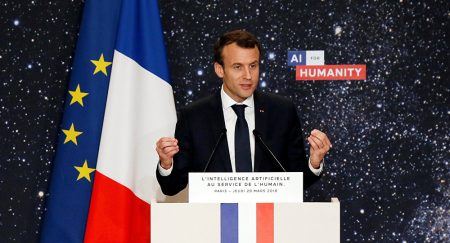April 3, 2018 – Artificial intelligence (AI) is lauded and feared by many. Some see it as an existential threat to our species. Others describe its arrival as the beginning of new golden age for the planet. The world’s most savvy technology companies, IBM, Alphabet, Amazon, Apple, Facebook, and others are working on new deep learning algorithms to create self-learning machine intelligence. Military contractors are hellbent on creating AI as well. For the most part, all of these AI development projects are geared to provide either corporate or military competitive advantage in the marketplace or on the battlefield. But Emmanuel Macron, President of France, sees the path for French AI development in a very different light.
In an interview with Wired magazine, following a speech (you can watch it but unless you understand French you will be at a disadvantage) given at a seminar entitled AI for Humanity, Macron described his country’s national strategy in the coming decades. For Macron AI is a disrupter and accelerator of trends in business and scientific fields. He sees the role of France as a strategic hub for AI education, training, research and the creation of new startups. That means creating a financial and regulatory regime that is friendly to existing and future AI ventures. Macron also believes that AI development requires an ethical construct that reflects democratic values. He is particularly interested in exploiting AI for healthcare to make treatment more predictive and personal without trampling on patients’ rights of privacy.
Macron differentiates the approach he wants France to take from that of the United States and China, the current world leaders in AI research and development.
He points out that the current Cambridge Analytica and Facebook controversy reflects a number of flaws in the American private-sector, market-driven research, and development in AI. The drive to vehicle autonomy is also an AI strategy that is competitively driven by market forces with all the potential faults that can ensue (consider the latest Uber and Tesla accidents that have brought into question the pace of this AI innovation).
He also critiques China’s approach which appears to focus on massive data collection and pattern recognition in support of a centralist, non-democratic state.
To Macron the key driver for AI should be human progress first and technology second. There is no point in developing an AI tool that does not address the collective benefit to all of humanity derived from the technological advancement. For Macron the AI revolution is all about attracting the best minds to France to work in academic and industry research centres dedicated to solving energy, climate, defense, finance, healthcare, and national and global defense challenges. Macron wants AI to be a job creator, to be a helper in the training and retraining of the French and European workforces for the jobs that will ensue from new inventions, processes, and systems that come from technological disruption.
Macron doesn’t want people to be ruled by AI algorithms but rather recognize their utility in helping society move forward. Macron recognizes he has a selling job to do in France and Europe. He states in the interview, “I can convince my country about change precisely because I embrace it. My role is not to block this change, but to be able to train or train people for them to get opportunities in this new world.”
For him, the best way to sell AI is to make it transparent. Any AI research and projects where public funds are involved in France, he states must be publicly accessible. He hopes he can make that stick with companies developing AI in France as well. Making AI algorithms open source is his dream as the way forward for France. It will be interesting to see how corporate players set or setting up research facilities in the country respond.
On the question of AI’s use in military defense, Macron is against the use of this technology to develop autonomous lethal weapons. He argues that automation and AI can serve the military effectively without entering the battlefield through weapon systems that have the ability to make life and death decisions against human opponents.
Macron recognizes that the speed of technological innovation provokes fear not only in France but elsewhere. He sees this fear as the seed that could lead to failure in developing AI that serves the needs of humanity. His selling job is to create what he describes as an ecosystem built on trust, that the AI algorithms produced in France will lead to a stronger, sustainable economy and democracy, to the collective advantage of researchers, private companies, new ventures, and citizenry.










